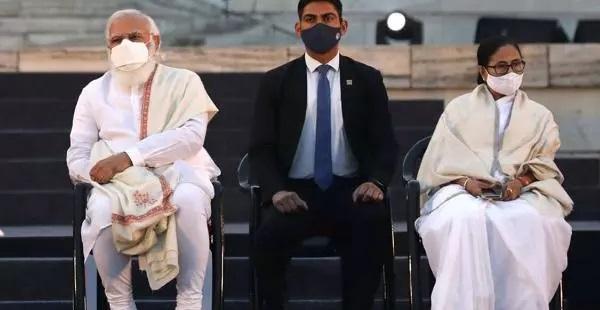West Bengal: Hits and Misses of the Lok Sabha Poll Outcome

Narendra Modi and Mamata Banerjee (File photo: Indian Express Twitter)
Kolkata: The Lok Sabha elections have ended in West Bengal with an enhanced tally for the ruling Trinamool Congress (TMC), leading to drop in number of seats for the Bharatiya Janata Party (BJP) and the Left-Congress alliance’s vote share failing to increase in this year's elections. The election results, after an arduous round of campaigning by TMC, BJP and the Left-Congress combine, have thrown open a fresh round of questions in the state’s political arena.
NewsClick spoke with some noted political analysts, lawyers, academics and journalists about how they see these results and the political prospects in the state.
“The overall Lok Sabha election results in the country have been encouraging. The ‘dance of democracy’ has contained divisive forces in the country”, said Professor Anjan Bera of the department of journalism, Calcutta University.
“There has been progress in clear terms and the people's agenda against neoliberalism has been bolstered by these election results. The need for an alternative policy has been being bolstered and the notion that there is no alternative to the corporate- communal alliance has fallen flat. Now there is an alternative, and people can assert it”, he added.
On West Bengal, Bera said the Left-Congress alliance was not able to achieve much electorally, but the results indicate that that more people’s movements need to be forged. He pointed out that although TMC “used the Sangh Parivar as a launching pad in 1998, but today the people are electing the same forces in West Bengal to save their skin from BJP''.
“A peculiar situation has arisen in Bengal due to polarisation between BJP and TMC. Overall, the impact of secular politics championed in the current elections in the country will definitely be felt in West Bengal. But, issues, such as pro-people policies, secularism, people's economy, decentralisation of power and probity in public life cannot be fostered by a compromising force like TMC in West Bengal,” he added.
Bera said the politics of West Bengal “will not flow in a straight line but through meandering curves in the coming days. Throughout the country, the bolstering of the democratic movement will further boost the cause of the Left in the state. The neoliberal economy is trying to push a narrative that there is no alternative when it comes to the corporate-communal nexus, but people have shown otherwise. Even in Ayodhya (where Ram Temple was built), the people have proved BJP wrong.”
On being asked if schemes like Laxmi Bhandar (a state scheme that gives Rs.1,000 per month to all women from the weaker sections and Rs.1,200 to women from the Scheduled Castes and Tribes-SC/ST) played a role in the surge of support for TMC, Bera said that was not the case.
“Any development project expires within a shelf life. Relief is not the end of governance. Social security projects run throughout the country, but new possibilities of job creation are not there in West Bengal. Just because I am getting Laxmi Bhandar, my daughter or son will not get a job. Industrialisation has come to a halt in the state. The TMC’s victory is due to political reasons, not due Laxmi Bhandar”, he added.
Sukhbilas Barma, a former IAS officer and former PAC chairman of the West Bengal Legislative Assembly, said this vote had not been good for the ruling TMC in SC and ST inhabited areas, adding that the party had lost seats.
“The main reason for the ‘not so good’ performance of the Left-Congress combine lies in the fact that the alliance was sealed at the last moment and the AICC nod, too, came at the last moment. There was a time when they tried to seal the alliance within the INDIA bloc parties, including the Congress. But state Congress chief Adhir Chowdhury rightfully decried the move, saying how could Congress carry its interests with TMC, which was a party of corrupt people. The time has come to build the Left-Congress alliance from the ground level and forge a strong alternative before the 2026 Assembly polls”.
Barma was also of the view that the Left needed to introspect and assert the socialistic ideology which was being challenged by the Brahminical ideology in the country, as indicated in the results from Kerala. He also felt that schemes like Laxmi Bhandar were not instrumental in getting votes for TMC, as is being touted. In the extremely poverty-driven areas of North Bengal and Jangal Mahal, the TMC’s results have not been up to the mark, and these areas are inhabited by SC/ST people.
Zad Mehmud, professor of political science, Presidency University, told NewsClick, that it was not a question of Left-Congress debacle in West Bengal compared with the 2019 Lok Sabha poll result. Rather, it can be said that the alliance has not been able to fulfil the hope that the campaign had generated.
“The Left has not been able to increase its vote share significantly. What it has achieved is that it has been able to garner support during the campaign and found its place in mainstream discourse. The results in West Bengal are more less on expected lines. The TMC, despite facing so many corruption charges managed to sail through,” he said, adding that “a low-level equilibrium exists in West Bengal whereby the people are poverty-stricken and social security schemes are helping such people. They (TMC government) are not interested in job creation but keeping people poor and giving them some help. The TMC is getting some votes in lieu of such help.”
On the impact of Laxmi Bhandar, Mehmud said such schemes had a low shelf life. “After Kanyashree in 2016, Laxmi Bhandar began in 2021. Similarly, in 2026, two new schemes will come in”.
He pointed out that “no job creation is happening in West Bengal. The state per capita income is comparable to Chhattisgarh, a backward state. Earlier, Bengal was much ahead, but now it has receded further. This is the social cost of TMC’s misgovernance.”
However, he termed this as a “wonderful election”, as the regime representing a corporate-communal nexus was proved wrong.
“Although Narendra Modi has formed the government at the Centre, but the mandate has provided checks on his leadership. India is a young democracy with myriad problems like caste, poverty etc, but it has behaved like a very mature democracy in this year’s elections”, he added.
Senior Advocate and CPI(M) Rajya Sabha MP, Bikashranjan Bhattacharya, said throughout the country, there was an anti-BJP feeling due to the polarising speeches of the Prime Minister. In Bengal, religious polarisation was heightened with BJP harping on Hindu votes and Mamata Banerjee (TMC supremo) on Muslim votes. He was confident that in the 2026 Assembly election, people would vote against Mamata's (the Chief Minister) corruption and against religious polarisation. The Left-Congress alliance campaigned against both, he added.
Amal Sarkar, former senior editor in the Times Group and currently the executive editor of Bengali portal, The Wall, said opinion and exit polls regarding this year’s Lok Sabha elections didn't match the actual results. However, predictions about the vote share and results of the Left-Congress alliance in West Bengal have been proved almost right.
He felt the main reason for the poor show of the Left-Congress alliance was that the attempt to free Bengal’s politics from the BJP-TMC binary, didn't work. From the third phase of the polls, the tactics of religious polarisation of BJP-TMC could not be resisted by the Left-Congress alliance. Also, there were organisational weaknesses and fund constraints. This was a Lok Sabha election with which the welfare of the entire country was linked.
Sarkar was of the view that the Left’s earlier stand of not joining any Central government had dented its prospects. The election manifesto of CPI(M) this time appeared to be a charter of demands, implying thereby that the party would strive to get the demands met if the Left won. “The question arises that will the Left only keep pressing the demands or should they talk about implementing them as part of a government. This caused confusion,” he said.
Sarkar also felt that the Left-Congress combine was unable to break the TMC-BJP binary.
“A large section of people desired to see the end of Narendra Modi’s regime, not just in Bengal but elsewhere too. A noteworthy example is the result in Uttar Pradesh. People stood by the alliance formed just around the days the election was announced, by Congress and Samajwadi Party against BJP, although many among them wore saffron while going to the booths in the previous elections. Voters have chosen the party or group which, they felt, were capable of defeating Modi. In Bengal, TMC grabbed that chance; as against Modi, people pinned their hopes on Mamata.”
He said that “despite unimaginably strong allegations of corruption against Trinamool, like in the entire country, the issues that weighed more with the masses in Bengal were rise in prices of commodities, unemployment and other agonising issues related to daily livelihoods. Added to this was an unprecedented religious propaganda under the leadership of the Prime Minister himself.”
On the Left’s poor electoral performance, Sarkar felt that the they couldn't leverage the farmers’ agitation well in Bengal. He pointed out that CPI(M)'s victory (the party’s candidate in Sikar won) in Rajasthan was a significant example of gaining electoral benefits from the farmers’ struggle. Also, the Left’s criticism of the Laxmi Bhandar scheme as ‘alms’ did not cut much ice, he said.
“It's not that such allowances are any kind of solution. The real need is to increase the earnings of the people. CPI(M) raised this real issue in their campaign. Their question why the TMC government could not start even one cycle factory was valid. But, along with this, one has to admit the rude reality that thousands of women eagerly look forward to their bank passbooks where Rs 1,000 are deposited under Laxmi Bhandar", he said.
According to Sarkar, the challenge for the Left lies in reviving its relationship with the downtrodden. The orientation of Mamata Banerjee's politics is toward lower income groups who are beneficiaries of government schemes. Policy-wise, the Left has a similar stand.
“Mamata Bandyopadhyay has, even when remaining a Rightist roader, adopted Left-leaning welfare measures and has thus changed the outlook of people, more so of the lower strata. The Left has to admit this reality and offer a better alternative for the toiling masses,” Sarkar added.
However, despite the Left not winning any seat, there were certain positive aspects that led to a belief in the minds of people that CPI(M) was making a turnaround this time, Sarkar said.
“The added importance given to youth and women in selection of candidates and the intensive campaign are examples of this change. These positive aspects, I think, will pay dividends to CPI(M) in the coming elections. Many a times, sowing good seeds, putting fertilisers and sufficient irrigation arrangements do not produce good yields; however, the soil remains fertile for the next season and gives a good yield”, Sarkar added.
Get the latest reports & analysis with people's perspective on Protests, movements & deep analytical videos, discussions of the current affairs in your Telegram app. Subscribe to NewsClick's Telegram channel & get Real-Time updates on stories, as they get published on our website.























